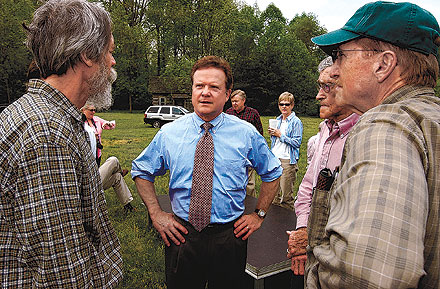Mic.com
Witness the rupture.
Once the worry of minorities and leftists, the ease with which a white man with a badge can end the life of a black person is finally on America's mind. The realization that police practices can be brutish and unfair to black men has become a matter of serious concern for many whites, bourgeois liberals and some conservatives — apparently even George W. Bush. Law enforcement is undergoing a crisis of legitimacy.
But the window of opportunity for the racially equalized institutional changes, which we desperately need, is wider than it's been in decades. The recent non-indictments for police killings in Ferguson, Missouri, and Staten Island, New York, have reignited awareness of the systemic nature of racial discrimination. Riot, protest and media pressure has made the White House anxious and piqued the interest of a generally useless Congress. Some modest reform is in the works.
But all of this is fragile. When there is a long enough pause in the rate at which black men are killed by the police, the cameras will point elsewhere. If there is any hope of reaping lasting change from this moment, it must take shape in the form of something more durable than rage.
"Black Lives Matter" is the closest thing we have to a unified rallying cry for this movement. It's a slogan, a website and a Twitter hashtag, which first surfaced in 2012 in response to vigilante George Zimmerman's acquittal after he killed unarmed black teen Trayvon Martin. At this point, the phrase has become shorthand for the various streams of resistance to police brutality across the country.
The Black Lives Matter movement resembles Occupy Wall Street in 2011, which is cause for both celebration and concern: Both establish a polarizing antagonist — police, bankers — who serves as an entry point for structural critique (systemic racism and politico-economic inequality, respectively). Both have given birth to and mobilized highly decentralized, politically diverse and fairly spontaneous protest movements. Both operate amid contentious politics and feed off friction — or the threat of it — with the state. And just as Occupy mostly dissolved during its first winter, so too could Black Lives Matter.
So now the movement must evolve. Here are three ideas for those interested in carrying on with campaigns under the umbrella of Black Lives Matter:
Public protest is a tactic, not a strategy: Protesting is vital, but it's not a substitute for the organization, discipline and grit needed for long-term change. Groups small and large need to organize locally and coordinate nationally on specific programs with short- and long-term goals. Resources for political, economic, legal and cultural advocacy need to be pooled and employed strategically. Campaigns for reform — whether assigning special prosecutors for police homicide trials, disarming public servants or closing the white-black wealth gap — must be focused. Local community efforts should be paired with efforts engaging the federal political process.
Past efforts with similar agendas provide useful case studies. One example worth considering is the rise of the Black Panther Party in response to police brutality in the late 1960s through the early '70s. Typically depicted as armed separatists, the Black Panthers were antiracist and committed to building interracial coalitions. Their most divisive position, advocacy of armed self-defense, was only one relatively short-lived element of their complex political program. Soon after they developed a nationwide following, they focused on community programs providing free services to neighborhoods; their most popular nationwide initiative was the Free Breakfast for Children Program. The Panthers' other communitarian programs — which included free clothing, medical care, transportation, housing cooperatives and much more — highlighted the shortcomings of the state and economy, while empowering ordinary citizens to conceptualize and participate in an alternative political economy.






![[PDA - Heathcare NOT Warfare - Sign the Petition.]](http://pdamerica.org/images/ads/HealthNotWar_final.jpg)


